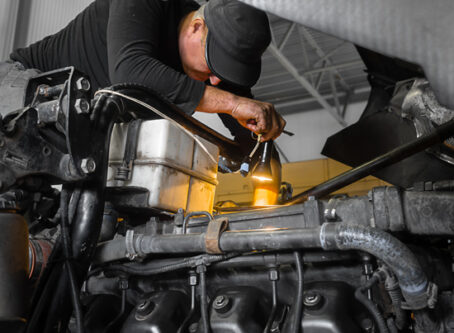Oregon legislation would fix tax disparity for large trucks
On the heels of a lawsuit in Oregon that addresses large trucks based in the state being overcharged for transportation taxes, multiple bills introduced at the statehouse seek to rectify the issue.
Late last month, the Oregon Trucking Association and three motor carriers filed a lawsuit against the state of Oregon, the Oregon Department of Transportation, Gov. Tina Kotek, and the Oregon Senate and House leaders. The lawsuit claims that the state’s weight-mile tax is unconstitutional because it forces truck drivers to pay more than they should be required to pay.
At issue is the state’s constitution, which requires the state highway fund to be “fair and equitable to light and heavy users alike to ensure that cars and trucks pay their fair share of the usage of the road.”
Jana Jarvis, OTA president, said the weight-mile tax is an “antiquated system of taxation” that needs to be updated.
“We’ve decided we just couldn’t wait for them to decide they were going to get around to fixing it. We needed to take legal action in order to get the state to address this issue,” Jarvis told Land Line Now.
She added that the state Legislature is responsible for making the change.
“It has to become a priority for policymakers in the state,” she said.
State legislation to address issue
While the legal process gets underway, Oregon House and Senate lawmakers have introduced bills to rectify the disparity between revenue paid by motorists and truckers.
Rep. Shelly Boshart Davis, R-Albany, is behind a bill (HB4165) that would require the Oregon DOT to prepare and submit a report on needed changes to state law to balance costs between cars and trucks.
She highlighted the state’s biennial Highway Cost Allocation Study. The study is used to understand the cost responsibility of each class of vehicle.
The 2021-2023 report showed that heavy vehicles overpaid by 16%, while the 2023-2025 report showed heavy trucks were overpaying by about one-third. Specifically, heavy-duty vehicles are expected to overpay by 32.4% during the next biennium.
In order to bring the heavy vehicle equity ratio back into balance, the study recommends reducing weight-mile tax rates across the board to approximately 70% of their current rates.
“As a proud owner of a family-operated trucking business myself, I fully support the Oregon Trucking Association’s lawsuit against the state of Oregon for overpayment of weight-mile taxes,” Boshart Davis said in prepared remarks. “Our trucking businesses have been paying far more than our fair share of highway taxes for too long.”
On the Senate side, two nearly identical bills would lower weight-mile taxes. SB1519 and SB1543 also would limit ODOT spending.
SB1519 includes another provision to require the transportation department to adopt rules specifying the manner of calculating, applying and issuing refunds to taxpayers who overpaid weight-mile taxes in recent years.
All three bills are scheduled for a Joint Transportation Committee hearing on Thursday, Feb. 15. A “Register to Testify” link is available on the hearing page.
Recent legislative effort fell on deaf ears
In December, two Oregon state lawmakers pushed for a one-day special session to reassess the state’s tax collection on large trucks.
Sen. Brian Boquist, R-Dallas, and Rep. Anna Scharf, R-Amity, put in a request with legislative administrators for House and Senate lawmakers to vote on whether to convene an emergency session to address weight-mile tax collection.
Scharf wrote that while the weight-mile tax is paid by large trucks, the cost is passed onto Oregonians as increased prices on goods and services used daily.
“We simply cannot force trucking companies and independent truckers to shoulder the burden of Oregon’s transportation taxes and continue to knowingly violate Oregon’s Constitution,” Scharf said.
The special session request was declined. LL









